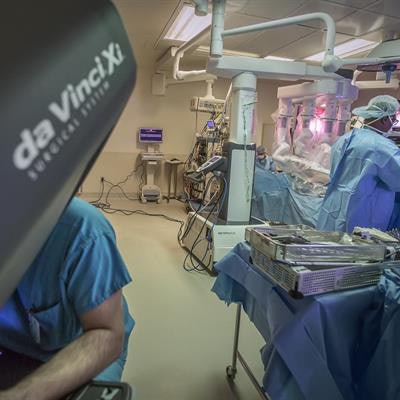
Patients with early-stage mouth and throat cancer who undergo robotic surgery have better survival rates and receive less adjuvant chemoradiation than those who have nonrobotic surgery, according to a study published on August 20 in JAMA Oncology.
Robotic surgery appears to be as safe and effective for oropharyngeal squamous cell carcinoma as standard surgery, radiation therapy, and chemotherapy, the researchers found. The U.S. Food and Drug Administration (FDA) didn't approve transoral robotic surgery for early-stage oropharyngeal cancer until 2009, they noted.
"Transoral robotic surgery was associated with improved surgical outcomes and survival compared with nonrobotic surgery in patients with early-stage oropharyngeal cancer," concluded Anthony Nguyen, MD, PhD, from the radiation oncology department at Cedars-Sinai Medical Center in Los Angeles, and colleagues.
 A Cedars-Sinai surgical team conducts a robotic surgery. Image courtesy of Cedars-Sinai Medical Center.
A Cedars-Sinai surgical team conducts a robotic surgery. Image courtesy of Cedars-Sinai Medical Center.Affecting many
Infection with the human papillomavirus (HPV) is often associated with the development of oropharyngeal cancer. The virus is estimated to cause 70% of oropharyngeal cancers in the U.S. Despite the availability of a vaccine, approximately 19,000 new cases of HPV-associated oropharyngeal cancer are diagnosed in men and women annually.
Transoral robotic surgery entails a surgeon using a computer-enhanced system and robotically guided instruments to remove tumors from the hard-to-reach back of the mouth and throat. After the FDA approval, the number of patients treated with the minimally invasive procedure rose significantly, climbing from about 18% in 2010 to 36% in 2015. This increase encouraged the researchers to assess whether the robotic surgery offered benefits over standard treatment.
For the study, Nguyen and colleagues used the National Cancer Database to assess 9,745 surgical patients, of whom 2,694 underwent robotic surgery between 2010 and 2015. The five-year overall survival rate for patients with early-stage cancer who underwent robotic surgery was approximately 85%. In comparison, the rate was about 80% for patients who had nonrobotic surgery, they found.
Also, robotic surgery was associated with less use of chemoradiotherapy. Approximately 29% of those who had the robotic surgery received adjuvant concurrent chemoradiotherapy, compared with 36% who had nonrobotic surgery.
More trials needed
Though the results were positive, the study had several limitations; for example, cancer-specific outcomes such as locoregional recurrence, cancer-specific survival, and quality of life were not available for analysis, they wrote.
Future trials should be conducted to better explore the optimal model for treating this type of cancer.
"Among patients undergoing surgery, [transoral robotic surgery (TORS)] was associated with longer survival, lower margin positivity, and less use of adjuvant chemoradiotherapy, compared with nonrobotic surgery," the authors concluded.




















